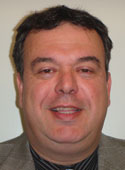By Micha Shalev
Dementia is caused by various diseases and conditions that result in damaged brain cells or connections between brain cells. When making a diagnosis of dementia, physicians commonly refer to the following criteria:
 •Symptoms must include decline in memory and certain cognitive abilities.
•Symptoms must include decline in memory and certain cognitive abilities.
•The decline in cognitive abilities must be severe enough to interfere with daily life.
It is important for a physician to determine the cause of memory loss or other dementia-like symptoms. Some symptoms can be reversed if they are caused by treatable conditions, such as depression, delirium, drug interaction, thyroid problems, excess use of alcohol or certain vitamin deficiencies.
Alzheimer’s Disease: The most common type of dementia accounts for an estimated 60 to 80 percent of cases. Early symptoms often include difficulty remembering names and recent events and apathy and depression. Later symptoms include impaired judgment, disorientation, confusion, behavior changes and difficulty speaking, swallowing and walking.
Hallmark abnormalities are deposits of the protein fragment beta-amyloid (plaques) and twisted strands of the protein tau (tangles).
Vascular dementia (also known as multi-infarct or post-stroke dementia or vascular cognitive impairment) is considered the second most common type of dementia. Impairment is caused by decreased blood flow to parts of the brain, often due to a series of small strokes that block arteries. Symptoms often overlap with those of Alzheimer’s, although memory may not be as seriously affected.
Mixed dementia has the characteristic abnormalities of Alzheimer’s and another type of dementia — most commonly vascular dementia — but also other types, such as dementia with Lewy bodies.
Recent studies suggest that mixed dementia is more common than previously thought.
Dementia with Lewy bodies: Pattern of decline may be similar to Alzheimer’s, including problems with memory and judgment as well as behavior changes. Alertness and severity of cognitive symptoms may fluctuate daily. Visual hallucinations, muscle rigidity and tremors are common.
Hallmarks include Lewy bodies (abnormal deposits of the protein alpha-synuclein) that form inside nerve cells in the brain.
Parkinson’s disease: Many people who have Parkinson’s disease (a disorder that usually involves movement problems) also develop dementia in the later stages of the disease.
The characteristic abnormality is Lewy bodies (abnormal deposits of the protein alpha-synuclein) that form inside nerve cells in the brain.
Frontotemporal dementia: Nerve cells in the front and side regions of the brain are especially affected.
Typical symptoms include changes in personality and behavior and difficulty with language.
No distinguishing microscopic abnormality is linked to all cases.
Pick’s disease: Characterized by Pick’s bodies (nerve cells containing an abnormal accumulation of fibers made of the protein tau), is one type of frontotemporal dementia.
Creutzfeldt-Jakob disease: Rapidly fatal disorder that impairs memory and coordination and causes behavior changes. Caused by the mis-folding of prion protein throughout the brain.
Variant Creutzfeldt-Jakob disease is believed to be caused by consumption of products from cattle affected by mad cow disease.
Normal pressure hydrocephalus: Caused by the buildup of fluid in the brain.
Symptoms include difficulty walking, memory loss and inability to control urination. Can sometimes be corrected with surgical installation of a shunt in the brain to drain excess fluid.
Micha Shalev, MHA, is the owner of Dodge Park Rest Home and The Adult Day Club at Dodge Park located at 101 Randolph Road in Worcester. The facility is holding two FREE support group meetings a month for spouses and children of individuals with dementia and/or Alzheimer’s disease. He can be reached at 508-853-8180 or by e-mail at m.shalev@dodgepark.com or view more information online at www.dodgepark.com. Archives of articles from previous issues can be read at www.fiftyplusadvocate.com.












